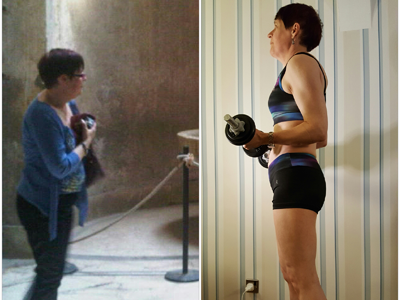
Becoming a Sports and Exercise Nutritionist
I enjoyed learning about nutrition and tracking my results as much as I enjoyed exercising, so I decided to train as a Sports and Exercise nutritionist. Other people, family and friends started to ask me for advice. I realised that if I could do it at my age with a substantial amount of weight to lose then anyone could do it with the right information. I wanted to be able to help other people in the same situation, that it is possible with a consistent and determined approach.
The mains thing I have learnt from my own weight-loss experience:
- You cannot change too much too quickly,
- You just have to keep going,
- Take it one day at a time,
- Make small changes for the better every week and
- Track your results.
Everybody always wants to lose body fat quickly but if it took you years to put it on it will probably take some time to take it off again and continuous effort to keep it off. There are no quick fixes, magic shakes or diets that work. If you lose it quickly you are just as likely to put it on again and add more weight too. I train six days a week and eat healthily to stay fit and healthy and to maintain my body composition which I have worked so hard to reach.
I now work alongside the gym in which I train and offer nutritional advice to clients of all ages. I tell my clients it takes time but to remember that the first few weeks of any new eating plan are difficult so:
Make small permanent changes so it is easier to manage and stick to.
Creating new habits and finding healthy foods can be fun if you keep trying different things and when you find what’s right for you it becomes a lifestyle change that works and the body fat goes.
The nutritional advice I provide is not complicated:
- Eat three meals each day and 2 healthy snacks. Space these out regularly throughout the day seven days a week and do not skip meals
- Drink plenty of water especially if you still feel hungry after eating to avoid being dehydrated
- Eat food rather than drink your calories: reduce fizzy drinks, juices, bought smoothies, alcohol and milky coffees
- Choose food that is as natural and as unprocessed as possible with little or no added sugar such as lean meats, vegetables, fruits, nuts and small amounts of wholegrain pasta, rice, bread and potatoes.
- Plan your meals in advance and prepare your meals in bulk if you can so that the fridge and freezer are full of healthy food
- Treat yourself once per week to a meal of your choice and stick to healthy meals for the rest of the week
- Breakfast: My favourite breakfast is a two-egg omelette with spinach and salmon or bacon
- Lunch: My favourite lunch is a healthy salad with lots of chicken or tuna.
- Evening meal: My favourite is fish, chicken or steak with lots of green vegetables and sweet potato.
- Snacks: My favourites are nuts, rice cakes with some peanut butter and I enjoy 150g Greek yoghurt and fruit. In winter I enjoy porridge with a banana.



